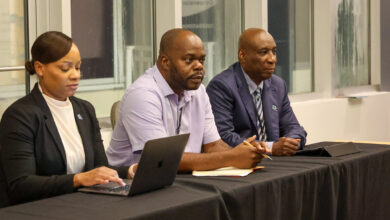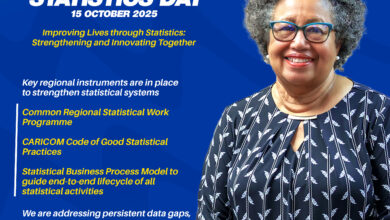Ministers of Government
Deputy Secretary-General
Other Distinguished Ladies and Gentlemen
This is an important event for the youth of the Caribbean and indeed for the CARICOM Community. This evening we are actually here to launch the activities of the CARICOM Commission on Youth Development, which was mandated by the Conference of Heads of Government in July 2006. It is my pleasure as the Lead Head for Youth Affairs, Gender, Culture and Sport to welcome you all to the Republic of Suriname.
In August 2002, I had the pleasure to preside over the inauguration of the CARICOM Youth Ambassadors Programme (CYAP). I recall the high level of enthusiasm of that Group, as it charted three priorities, namely the CSME, HIV/AIDS and the environment, around which the CYAP would focus its activities. I am pleased to note from the half-yearly reports from the Directorate of Human and Social Development, that the CARICOM Youth Ambassadors have advanced their work programmes, especially, in the areas of the CSME and HIV/AIDS.
CSME: the Flagship of the Community
The CSME is indeed the flagship of the Community’s drive to consolidate and deepen the process of regional integration. Much has happened over the past three to four years, which has built on the hard work of the Secretariat in developing the over one hundred protocols required to guide the necessary legal arrangements for the execution of common policies among Member States in the free movement of trade, services and people.
The Caribbean Court of Justice, which was established in March 2004, and the CARICOM Single Market, established in January 2006, are significant landmarks for all of us in the Community.
It is one thing to create the CSME, but an essential ingredient to its sustainability is finding the formula to make it work efficiently. Among the components of this ingredient are establishing the rules that guide policy, implementing the agreed policies and ensuring that there are mechanisms that ensure fair and equal access by Member States and individuals to the opportunities of the Single Market and Economy.
I am pleased that one important regulatory mechanism of the CSME, the Competition Commission, is located in Suriname. This entity will develop and amend regulations for policies related to trade services and people and facilitate, through monitoring and evaluation, the harmonization of policies and programmes that are a prerequisite to making the single market truly effective.
Suriname and eight other CARICOM countries have issued CARICOM passports, and by the end of this year four others are scheduled to do so. This is a symbolic, but most important development, as it signifies the bonds that exist among the peoples of our Region as we move toward greater coherence, not only with respect to trade in goods and services but in the movement of our peoples within a common economic space.
In this regard, the programmes that deal with accreditation and standardization of qualifications throughout the Region provide for an equitable footing for all Caribbean peoples. Suriname, with its distinctive education and legal systems within the CARICOM family, is currently being given special attention in the development of the Regional Accreditation Authorities, the translation of laws and the translation of the Charter of Civil Society into Dutch, and the preparations for the establishment of the Caribbean Regional Information and Translation Institute in Suriname.
In just a few short years the CSME process has come a long way, but there is much more to be done.
The CARICOM Commission on Youth Development, therefore, will be required to thoroughly examine the role of youth in the CSME:
How do they participate effectively?
How do they benefit from the opportunities?
What are the programmes that must be developed to improve the effective involvement of young people?
HIV/AIDS and other Health Risks
The second programme area in the list of priorities established in the CARICOM Youth Ambassadors Programme is the issue of HIV/AIDS. The involvement of the CARICOM Youth Ambassadors Programme in prevention of HIV/AIDS has been commendable. From the half-yearly reports we become aware that one of the catalysts for this activity has been the mini grants programme to which the Deputy Secretary-General referred in her remarks.
It has been significant that through this programme Caribbean Youths have been able to set and implement an agenda of work with the support of the Pan Caribbean Partnership Against HIV/AIDS (PANCAP). PANCAP reaches out to a wide cross-section of youth, among whom HIV/AIDS is most prevalent and which accounts for the highest level of death among young people between 15 – 35 years.
While the Commission must continue to focus on HIV/AIDS and in particular on the strategies for inducing behaviour change to mitigate the spread of this disease, it also needs to examine other health risks that are emerging, including the use and abuse of drugs among young people and the prevalence of chronic non-communicable diseases which have been highlighted in the Report of the Commission for Health and Development chaired by Sir George Alleyne, UN Special Envoy for HIV/AIDS in the Caribbean and former Director of PAHO. During his visit to Suriname in August 2006 I had the pleasure of investing Sir George with the highest order of Suriname.
Sustainable Development
In the area of the environment, however I have the feeling that not too much has been done. The Commission, therefore, has an opportunity to help to redefine this area of concentration.
I believe there is need to broaden the concerns to deal with the wider issues of sustainable development for youth.
In this context, there is need to focus on the economic, social and environmental factors that are necessary to sustain youth development and the role that youth must play in the sustainability of these programmes.
The Commission would therefore need to connect sustainable development with the achievement of the Millennium Development Goals, which deal with such issues as early childhood development, access to education, health services, drinking water, employment and participation and in decision-making. All these indicators are of concern to a youth development strategy. In addition, they help us to focus on the youth that are most at risk. They also ensure that our policy prescriptions target poverty reduction, social protection and job creation, without which youth development is an empty vessel or a slogan we cannot afford.
Cross-Cutting Issues
Cutting across all these elements identified with sustainable development are issues of gender and culture, which must also receive the highest attention. Our Heads of Government continue to raise the issue of the underachievement of young males. While I realize that COHSOD has been examining this issue, there is need for a more proactive policy approach, especially since the comparable indicators include the increasing ratio of young males in our prisons for crime and violence, the increasing role of violence in schools, the links between crime and drugs among the youth and the high rates of teenage pregnancy throughout the Region.
The need for solutions is even more urgent when to these tendencies, which have detrimental effects on our youth, and indeed on their families and communities, are added the cultural penetration from the international media that glorifies violence and risky behaviour.
During a discussion at COHSOD X, held in Suriname in 2004, a World Bank Report on the economic implications of risky behaviour among youth was discussed.
We need the Commission to provide us with the stark reality of the burdens of these risks and the social and economic options for pursuing behaviour change.
Moving on with the Youth Development Agenda
The Commission will have to focus on how to turn these negative tendencies into positive ones. What are the institutional mechanisms that should be put in place to do this? Where do the schools, the churches and the family as primary institutions fit in? What are best practices?
There are undoubtedly more questions that will arise during the discussions you will have during the next two days. I wish you success in your deliberations, as you try to refine the terms of reference and to come up with a work programme and plan of action.
The CARICOM Commission on Youth Development must help to ensure a place for our youth as meaningful citizens of the Caribbean, capable of functioning effectively in this new global order.





